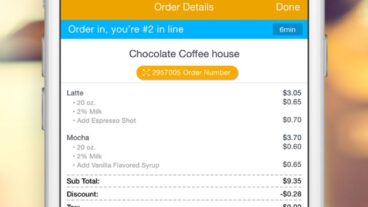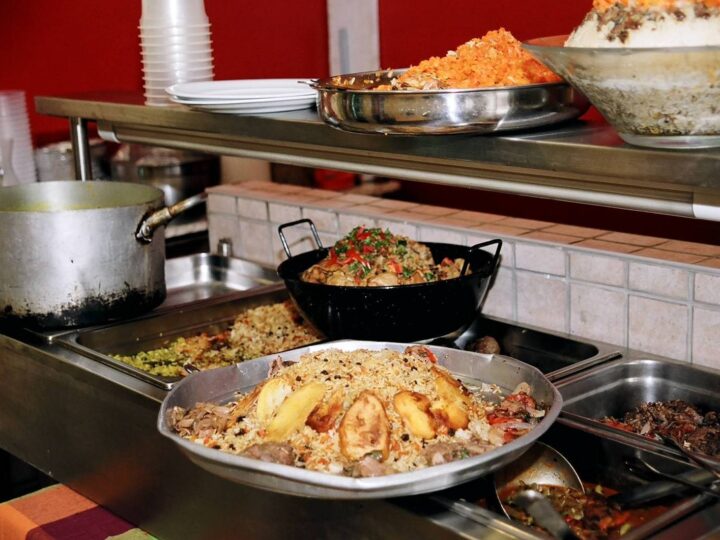At some American colleges, as much as 99 percent of the student population uses Tapingo, the Israeli mobile commerce app for ordering on the go from any food establishment on campus.
Since 2012, Tapingo has partnered with about 100 campuses across the United States and Canada. Half a million users (students, faculty and staff) rely on the app two to five times per week to get their chow with minimal effort, accounting for nearly half of all food orders placed on participating campuses.
Judging by the tweets on Tapingo’s Twitter page, this app is nothing short of a revolution.
“Tapingo is the biggest game changer since Thomas Edison invented the lightbulb,” one student tweeted, while another wrote in early August, “One thing to really look forward to when going back to school is Tapingo.”
Considering that Facebook began as a college phenomenon, the possibility for Tapingo’s growth is not just pie in the sky. With $36 million in investments, and a rapidly expanding customer base, Tapingo is poised to become the big enchilada.
Tapingo goes to college
When ISRAEL21c first reported on the company in 2011, it was starting out by partnering with about 100 restaurants in central Tel Aviv and the Ramat Gan diamond district. Within two years, the founders saw that they’d have to have a much, much bigger pool of choices to entice people to use the app. And they couldn’t afford that kind of expansion.
Rather than throwing in the towel, Tapingo relocated its main office to California (today, about 20 of its 60 employees work in the development center in Israel) and concentrated on the college scene, where it was simpler to tap into all the dining options on any given campus.
“When students open the app, we want them to be able to order from wherever they want, with no restrictions or limitations. Working with college campuses, we’re able to provide the best service possible,” CEO Daniel Almog tells ISRAEL21c.
“The prevalence of Tapingo in the college market has dramatically transformed campus life, and our vast and growing user base has adopted Tapingo as part of their daily habits.”
The technology itself was never an impediment to success. It was developed by Almog and Udi Oster, both veterans of the IDF’s fabled 8200 signal intelligence unit, which has produced some of the leading high-tech entrepreneurs in Israel.
“At 8200, we learned to take seemingly insurmountable problems and break them down into smaller, tractable ones. We’ve adopted this same mentality at Tapingo,” says Almog, who was raised in Minnesota and earned a Harvard degree in mathematics before moving to Israel and joining the military.
“When people think about mobile commerce, it can seem very daunting. Our technology and prevalence in this industry is the result of our ability to tackle issues effectively and overcome challenges.”
This fall: No waiting
Like any high-tech startup, Tapingo is constantly challenging its software engineers to improve and refine the product. This fall, it is rolling out three streamlining features to get food into customers’ hands as quickly as possible: Tapingo Delivers, Scheduled Ordering and Quick Pick.
“Tapingo Delivers facilitates on-demand delivery from on-campus venues to on- and off-campus customers,” Almog explains. “Tapingo will be handling all logistics, staffing and technology. Through Tapingo Delivers, we’re solidifying our app as the ‘buy button’ for college students.”
There’s an advantage for the business owners as well: “If customers opt for delivery, merchants can reallocate servers and bussing staff to food preparation, thereby decreasing the wait time for all patrons.”
Scheduled Ordering allows users with more predictable schedules to order far in advance for pickup at a specific time. This, too, offers advantages for the providers as well, as orders can be assembled off peak.
Quick Pick prioritizes food and drink orders requiring minimal prep time, such as items from a display case.
“For example, have you ever been stuck in line behind someone who orders an iced-mocha-choca-one-pump-vanilla latte with extra foam when all you wanted to do was buy a bottle of water? Instead of waiting, either in line or virtually, Tapingo Quick Pick fast tracks grab-and-go items like water,” says Almog.
The app has also incorporated digital coupons and loyalty cards. “We love working with students and we’re eager to keep working with them even after they’ve left school. Our next steps will be to turn loyal customers into lifetime customers,” Almog tells ISRAEL21c.
For the eateries – which do not have to install any hardware to participate – the Tapingo app offers analytics to help them drive sales and stay stocked with the ingredients they need most.
During the school year, Tapingo handles 25,000 payments per day, and makes its profits through a small commission per order. In April, the company announced its series C funding of $22 million, giving it a total of $36 million in investments.
“We’re gearing up to launch an additional 100 campuses over the next 12 months,” says Almog.
For more information, click here.


















